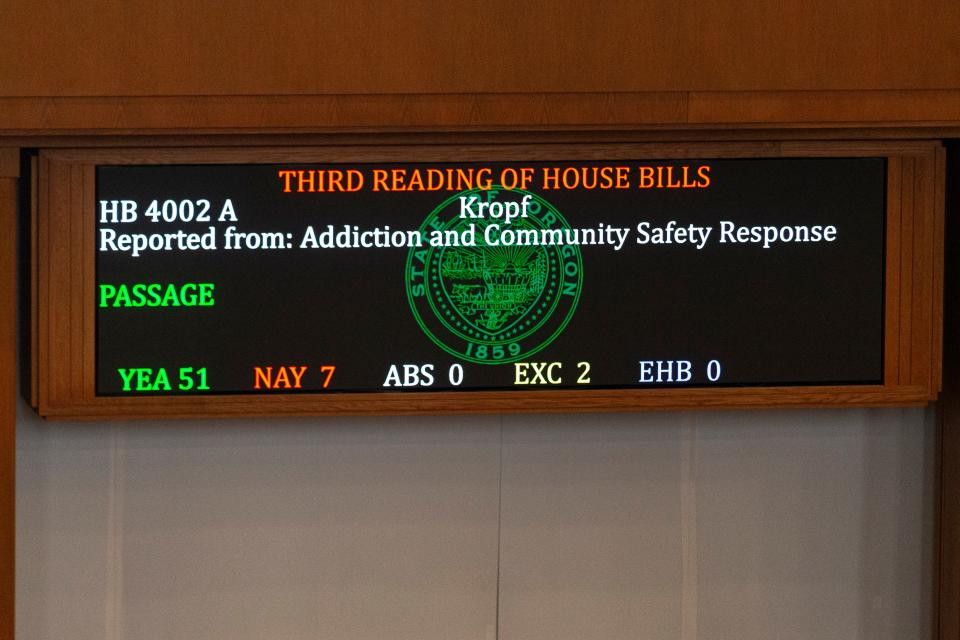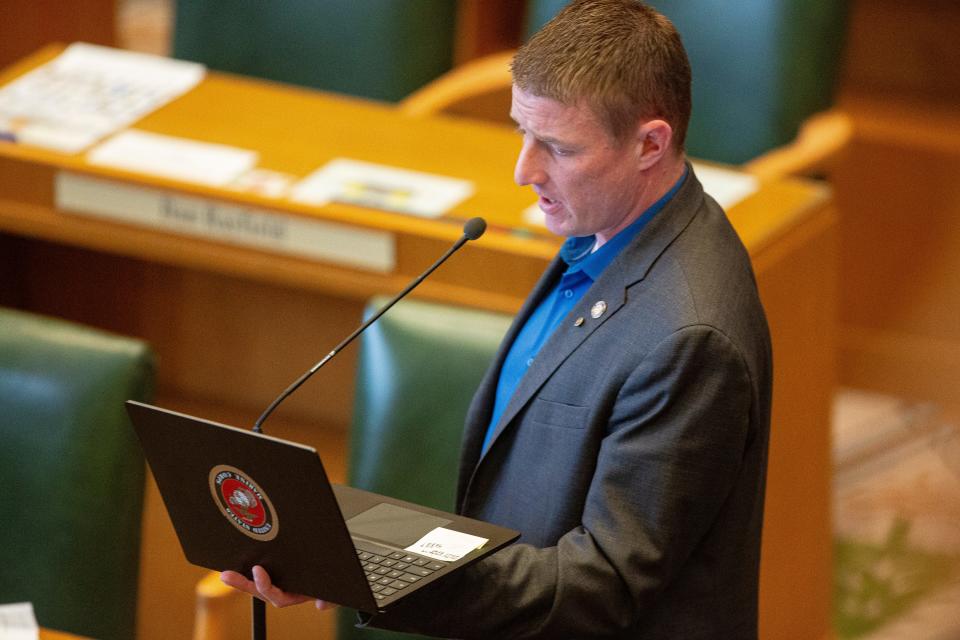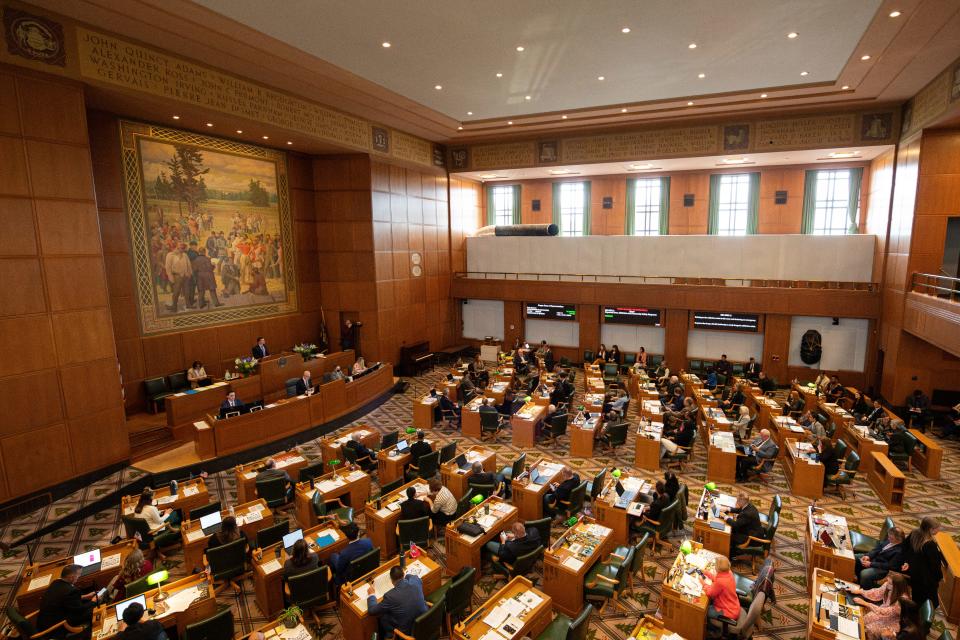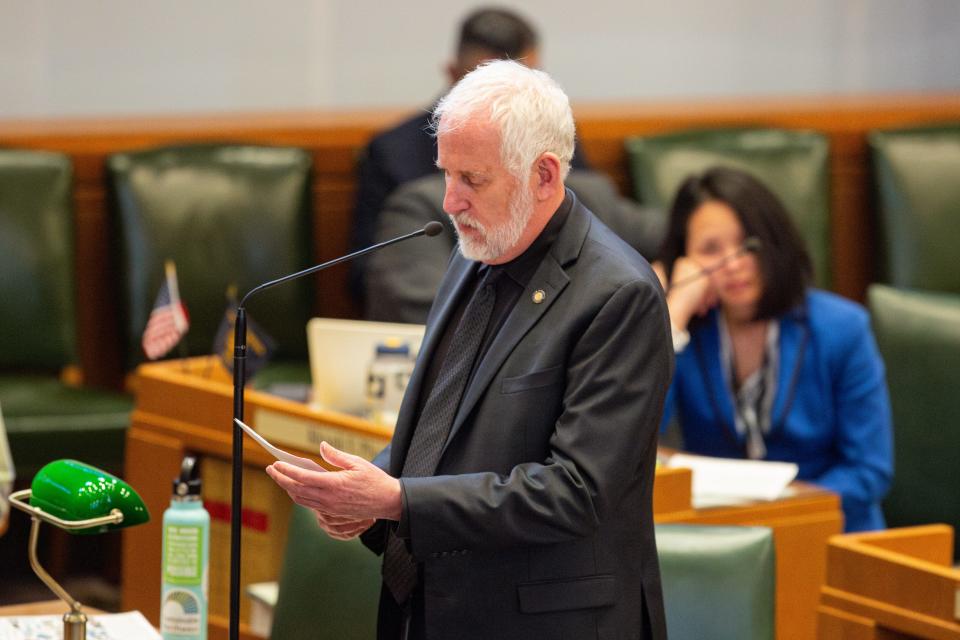Oregon House passes bill to reintroduce criminal penalties for drug possession
Lawmakers took another step Thursday to roll back part of Measure 110, passing the bill reintroducing criminal penalties for possession of small amounts of illicit drugs out of the Oregon House.
House Bill 4002 passed by a vote of 51-7, with two members excused. Four Democrats and three Republicans voted against the bill, which now awaits a vote in the Oregon Senate.
The bill will penalize drug possession as an entirely new misdemeanor with penalties of up to 180 days in jail. Counties have been asked to commit to offering deflection and diversion programs; 23 of 36 counties have signed letters of commitment so far.
Current Class E violations, established under Measure 110, would be repealed and become unclassified drug enforcement misdemeanors as of Sept. 1. A defendant would first face 18 months of probation. Probation violations would result in 30 days of jail. If probation is revoked, a defendant could be released to treatment or face a 180-day sentence.
Records could be expunged upon completing a deflection program, two years after a citation without convictions, after successful probation or three years after conviction. The bill will also change the definition of drug delivery charges, enhance charges for dealers selling near treatment facilities, homeless shelters and public parks, and expand welfare holds from 48 hours to 72 hours.

Oregon lawmakers give testimony on bill recriminalizing drug possession
Lawmakers provided lengthy and at times emotional testimony on the House floor, often referring to the bill as a “first step” in responding to Oregon’s drug crisis.
"While this legislation is far from perfect, it is a step in the right direction and provides our law enforcement with the tools they need to keep our communities safe," said Rep. Kevin Mannix, R-Salem.
Rep. James Hieb, R-Canby, Rep. Annessa Hartman, D-Gladstone, and Rep. Dacia Grayber, D-Portland, spoke of how addiction had personally impacted their lives. Hieb spoke of losing two of his brothers. He said he had shared his family’s story so many times he was “numb” and said while HB4002 was not perfect, it was “better than I expected.”
Hartman spoke of her father’s struggle with addiction and the recent loss of her step-brother to a fentanyl overdose. Grayber, a firefighter, spoke of responding to a call where they found a man dead with his 2-year-old child curled up on his chest. The state had failed the man and his daughter, she said.
“We have an opportunity to change the narrative,” Grayber said.

House Speaker Dan Rayfield, D-Corvallis, said in a statement the vote signaled “tremendous momentum” to change Oregonians’ lives.
“With this bill and connected investments, we’re supporting them and helping to significantly expand their ongoing work, to move us into the next phase of our long-term commitment to establishing a sustainable treatment infrastructure that can efficiently get people from crisis to stability,” said Rep. Jason Kropf, D-Bend, chair of the Joint Committee on Addiction and Community Safety.
Kropf said the 137-page bill reflected months of conversations between stakeholders to take a new approach. The new misdemeanor provided "flexibility," when it comes to prosecuting possession, Kropf said, that made it clear "our goal is treatment and recovery."
House Bill 5204 is the budget companion of HB4002, directing $200 million to “shovel-ready” projects and programs, training for behavioral health workers, Medication Assisted Treatment programs in jails, education and increasing capacity in the criminal justice system.
Oregon's rollback of Measure 110 faces criticism
Opponents of the bill said the it was a return to a failed policy of criminalization and ignored the realities of Oregon’s already overwhelmed criminal justice system. As of Thursday, 2,908 people in the state were unrepresented in the state. The Oregon Public Defense Commission estimated it would need to hire an additional 39 full-time public defenders to provide the representation needed for the estimated new cases under the bill.
Speakers also pointed to the Criminal Justice Commission’s Racial and Ethnic Impact report released earlier in the week, which estimated the new law would have a disproportionate impact on Black and Latino Oregonians.
Advocates of Measure 110 and other criminal justice organizations said the bill was developed without input from providers.

Tera Hurst, executive director of the Health Justice Recovery Alliance, said service funding was delayed in the rollout of Measure 110 and the citation system never set up effectively.
“Two wrongs don’t make a right,” Hurst said in an emailed statement. “HB 4002 doubles down on the same mistakes the state made in implementing Measure 110. Unfortunately, it will be people struggling with addiction — especially those living outside and Black and brown Oregonians — who will pay the biggest price. And our communities will be no safer for it.”
The Oregonians for Safety and Recovery thanked Rep. Farrah Chaichi, D-Beaverton, Rep. Travis Nelson, D-Portland, Rep. Khanh Pham, D-Portland, and Rep. Mark Gamba, D-Milwaukie, for opposing the bill.
Gamba referred to the passage of the bill as a “regression” and said he was highly disturbed by a return to treating addiction as a criminal issue.
“Both my district and my conscience are calling on me to vote no on HB4002. That’s what I’m going to do,” Gamba said.

Other supporters of the bill pointed to a looming ballot initiative that would repeal Measure 110 as motivation to pass the bill. The Fix and Improve Ballot Measure 110 coalition behind the ballot measure released a statement applauding the bill’s passage.
The group said it would withdraw the ballot initiative if the bill passed in the Senate and Gov. Tina Kotek signed the bill into law.
“A law that achieves 85% of what we proposed now is well worth the lives and communities that will be saved sooner rather than waiting for the passage and implementation of a ballot measure over a year from now,” a statement from the coalition said.
Dianne Lugo covers the Oregon Legislature and equity issues. Reach her at dlugo@statesmanjournal.com or on Twitter @DianneLugo
This article originally appeared on Salem Statesman Journal: Oregon takes another step in rollback of Measure 110 drug law

